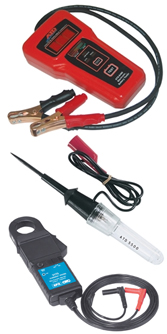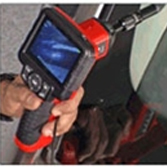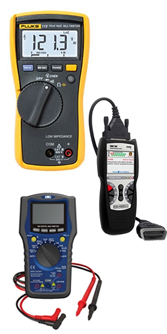All About Automotive Scan Tools for Cars
An important aspect of any garage is being able to efficiently and accurately diagnose issues within the vehicle's internal computer, and without scan tools, this would be nearly impossible. Scan tools, multimeters, and diagnostic cameras are all essential to the inner workings of the standard garage, with capabilities ranging from identifying and diagnosing or clearing codes to running internal diagnostics and gathering data.
We've compiled a list of the various types of scan tools, a valuable resource in helping you determine tools you'll need to ensure quick and accurate diagnostics, and improve your turnaround.
What Are Automotive Scan Tools?
These tools allow the mechanic to run a diagnostic check when any service lights may become activated in a vehicle -- check engine, service light, etc.
Automobiles have gradually become more computerized, and instead of manually checking the code, garages are able to read the error code with a scanner device in real time and more accurately source the problem. Scan tools display the fault codes for easy reading and allow access to the vehicle's computer, making diagnostics more efficient and easier.
Some have cameras to allow for viewing of tight spots, while others have broader functions with more connectivity options. Some, like the OBD scanner, follow a standardized procedure allowing for standardized results across all manufacturers.
Different Types of Scan Tools
Code Readers
Code readers are the most common type of auto scan tools used. Models range from inexpensive versions (around $50) that will only display the code number to slightly pricier ones that will also provide a brief description and are able to be used bilingually.
Technically, code readers do not qualify as a proper "scan tool" due to the fact that they are only able to read and clear codes; in order to read sensor and other system data, you will need an actual scan tool. The code reader is a great basic start to running vehicle diagnostics, and are a popular DIY way for a home mechanic to begin troubleshooting.
Battery and Electrical Scan Tools

Battery load testers and electrical scan tools are able to dig a bit deeper into the vehicle's system and return more info in order to assist the mechanic with the diagnostic process.
A battery scan tool evaluates and provides information on the battery quality and charging system, including whether or not the charging system is able to function under all conditions, as well as read battery charge rates to determine whether or not the battery is performing as it should. Most of these system testers will be able to store and then print out information for the mechanic to evaluate and share with the customer.
Electrical scan tools observe the data within the vehicle's computer, and have graphing or digital read-out capabilities in order for the mechanic to track performance and repair. These tools quickly determine if voltages are within a normal range on all vehicle components, instead of requiring a separate connection to each individual module to read the data. These electrical tools are an important part of any garage, as without this tool, obtaining and comparing data would require many steps that involved intrusion into connectors and wires.
Diagnostic Cameras

Auto Diagnostic Cameras are a bit more of a hands-on approach to troubleshooting and finding which area of the vehicle is in need of repair. They're mostly used for hard-to-reach areas of the car, and are available with basic or LED camera systems.
The best auto diagnostic camera for your money will allow audio/video playback, have a USB port to allow transfer of images/video to a PC, and have plenty of GB of storage. It's hard to beat an auto inspection camera for small areas that are difficult to assess in person.
Multimeter Scan Tool

Digital multimeters are small handheld devices that allow the mechanic to gather average readings on the vehicle's voltage, amperage, current, frequency, temperature, and pulse width, gathering an overall 'snapshot' of the vehicle's information. A good standard automotive diagnostic tool for any auto body shop, the only drawback to multimeters lies in the fact that their readings are more of an average, rather than an exact reading, making it difficult to pinpoint intermittent vehicle issues.
OBD Scanners
An OBD Scanner, or "On-Board Diagnostic" tool, is a standardized system used for self-diagnostics and reporting. Because it is standardized, this system uses the same communication protocols and code designations across all manufacturers.
All OBD scanners offer basic functions, such as the ability to read and clear codes, and more advanced models can also view and record live and stored data and access a vast spectrum of information. Advanced OBD scanners allow viewing of 'soft' (or pending) codes that haven't yet tripped the 'Check Engine' light. Data from just about every sensor in the vehicle is viewable with an OBD scanner tool, making it a great basic piece of equipment for any garage to have available.
Which Type of Tool Do You Need?
Automotive scan tools are an important part of the auto body process. Whether you need a camera to survey tight places or just need a quick code read and diagnosis, scanner tools offer many efficient and accessible options. Visit our collection of scanner tools and diagnostic equipment for more information and assistance in determining which auto scanner tools will help you get the job done right.


